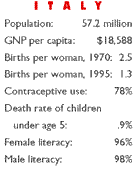 Few traditions are more time-honored in Italy than the centrality of the family. At one time, Italians had the highest birthrate in Western Europe; now, Italy has the lowest of any country in the world.
Few traditions are more time-honored in Italy than the centrality of the family. At one time, Italians had the highest birthrate in Western Europe; now, Italy has the lowest of any country in the world.
There are currently about 10 births per year in Italy for every 1,000 people–compared to 14 per 1,000 in Britain, 16 per 1,000 in the United States, and 23 per 1,000 in neighboring Albania. Today, what used to be one of the world’s most child-oriented cultures has become its most childless.
Daniela Pellegrini was 38 years old when her only child, Caterina, was born in 1991. Her own mother and father died when Daniela was still young. Like many women of her generation, she pursued a career–as an accountant at a catalog company, a job she held until the company closed in 1994. She found that even though women enjoy legal equality with men, they earn significantly less for the same work. She began living with Fabio, a teacher of Italian literature, in 1980. They married in 1993 to provide legal and social security for their daughter.

DANIELA PELLEGRINI: It wouldn’t have been good if I’d had Caterina when I was 20. Fabio and I traveled a lot and we had political responsibilities. Also, neither of us had any parents to help. But, as you become an adult, you look at what you have done and what you will do and you realize that you need someone. And so we had Caterina.
My life is very different from when I was working. I take Caterina to school at 9 o’clock and pick her up at 4:30. While she’s in school, I take care of my house, read, and go for walks. I go to the countryside to see the old houses, to get a burst of energy. The three of us spend our late afternoons and evenings together.
My family lives with dignity on what Fabio receives, but I would very much like to have a job. That’s the only part of my life I would change: to find work. I’d like to be a guide in Pienza, to explain Pienza’s history, or to be a travel guide in Europe.
Women face many problems in the working world. They have to coordinate work and family, and if there is no more work in a factory, women are the first to go. The law gives us the same rights as it gives men, but it is only on paper. The laws that are supposed to protect women, for example, are applied subjectively.
My expectations for Caterina are only that she be honest, brave, and happy. For her and for all children, I would hope that the world will be peaceful, that it will be easier for them to find work and live together without war. It probably won’t be that way, but it’s what I hope.















